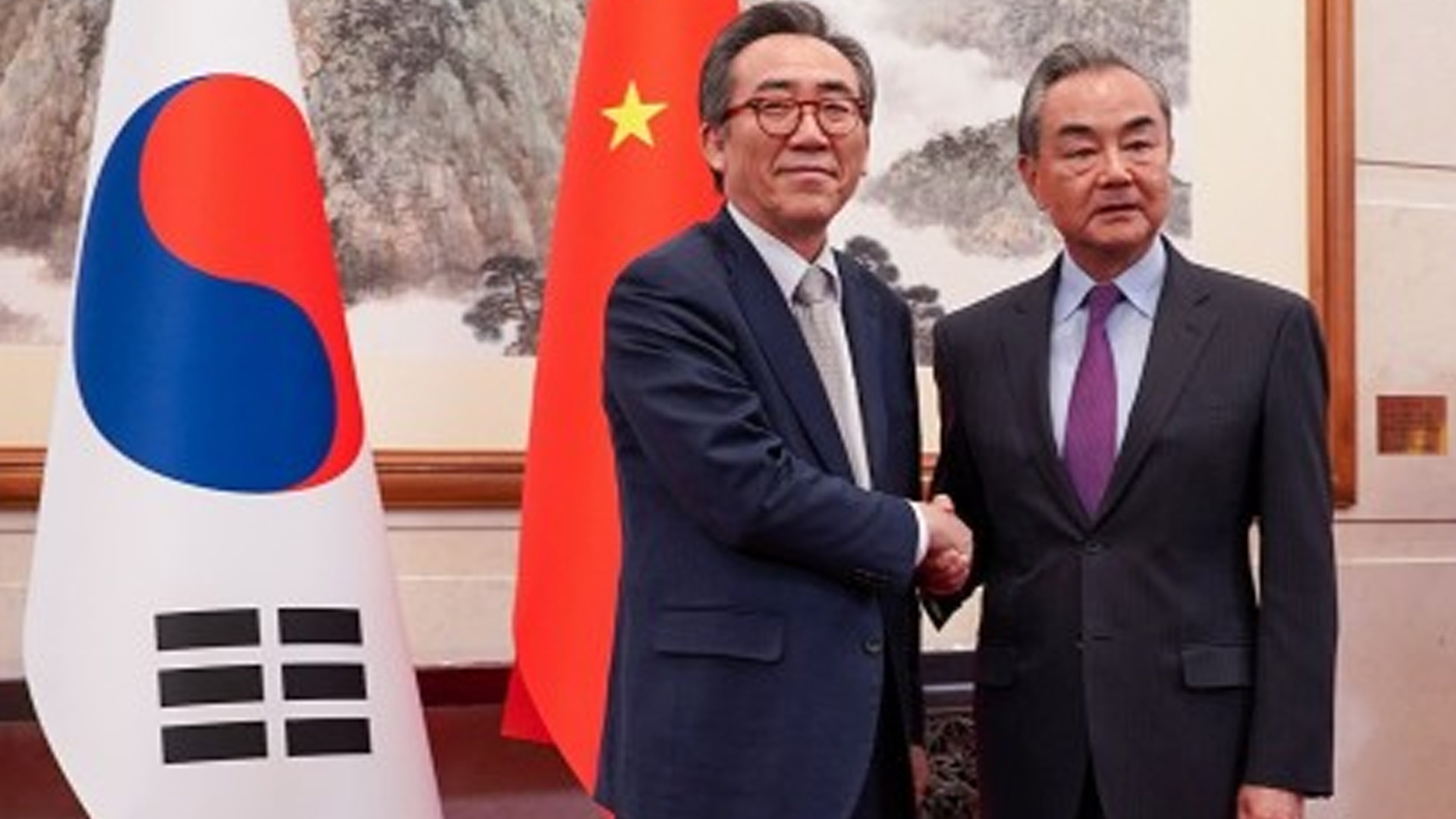The top diplomats of South Korea and China agreed Monday to work together for the successful holding of an upcoming trilateral summit also involving Japan widely expected to take place in Seoul later this month.
The two sides reached the agreement during talks between Foreign Minister Cho Tae-yul and his Chinese counterpart, Wang Yi, in Beijing, as Seoul seeks to capitalize on the leaders’ gathering to boost three-way cooperation with its Asian neighbors.
“The two ministers agreed to continue cooperation for the successful opening of the ninth South Korea-Japan-China summit that is due to soon take place in South Korea,” Seoul’s foreign ministry said in a press release after the ministerial talks.
South Korea has yet to announce the exact date for the event, but media reports have said that it will take place from May 26-27.
The two sides reaffirmed their commitment to developing the bilateral relationship into a “healthy and more mature” one, the ministry said.
Cho arrived in Beijing earlier in the day, on a two-day trip that marked the first such visit to the Chinese capital by a South Korean foreign minister in more than six years.
Monday’s talks came as South Korea seeks to manage its relationship with China which has cooled amid its close alignment with the United States under the administration of President Yoon Suk Yeol.
The deterioration in the ties was evident last year when its ambassador to South Korea, Xing Haiming, publicly warned his host country that Seoul would “definitely regret it” if it “bets on China’s defeat” in its rivalry with the US.
Beijing has also reacted angrily to Yoon’s comments about maintaining the status quo in the Taiwan Strait, lashing out at Seoul for “meddling in” its own affair.
South Korea has been looking to improve ties with China, its largest trading partner and a key player in nuclear diplomacy with North Korea.
In Monday’s talks, Wang expressed hope that the relationship with South Korea would develop further “without interference,” apparently cautioning against Seoul keeping in step with the United States in global supply chains and other strategic areas in Washington’s rivalry with China.
Wang said that the difficulties facing the bilateral ties were “not in line with the mutual interests of our two countries, and nor are they something that China desires.”
“I hope that we join our forces to push for a stable and healthy development of the China-South Korea relationship, as South Korea, together with China, sticks to the direction of mutual goodwill … and upholds the goal of mutual cooperation and face each other and move forward, while excluding interference,” Wang said through an interpreter.
At the meeting, Cho pointed out that South Korea’s relations with China and its relations with the US are not a “zero-sum” relationship, meaning that aligning closely with one country does not mean drifting away from the other.
“We don’t perceive foreign relations as a zero-sum relationship, nor do we manage them as such,” Cho said.
“I believe it’s important that not one side, but both sides, make efforts to carefully manage ties in a way that disagreements will not turn into conflicts for the development of bilateral relations,” he said.
Cho called for substantializing the future direction of bilateral relations and building bilateral trust, and hoped that his visit would be the “first step toward untangling the threads” between the two countries and “opening up a new avenue for cooperation.”
Cho highlighted the need to bolster high-level exchanges and invited Wang to South Korea, the ministry said. Wang was quoted as responding that he would do so at a “mutually convenient time,” as he hopes to revitalize such communication.
Cho also used the talks to raise concern over the growing “unlawful” military cooperation between North Korea and Russia and asked for China’s role as a permanent United Nations Security Council member to promote peace and security on the Korean Peninsula and for the North’s denuclearization.
He also delivered the government’s concern over the forced repatriation of North Korean defectors in China and called for Beijing’s attention so that such escapees could seek refuge in a third place.
Wang reiterated that China would play a “constructive role” to help resolve the Korean Peninsula issues, the Seoul foreign ministry said.
The ministers also agreed to reinvigorate exchanges at the municipal level.
Cho also stressed the need to ensure free access to cultural content as a way to help bring closer the younger generations of the two countries.
The talks were followed by a dinner banquet Wang hosted for Cho and his delegation.
Earlier in the day, Cho had a meeting with South Korean businesspeople working in China. On Tuesday, Cho will convene a conference of South Korean consuls general in China and discuss municipal-level exchanges.
Cho’s trip to Beijing marked the first such visit to the Chinese capital by a South Korean foreign minister since November 2017, when then-Foreign Minister Kang Kyung-wha paid a visit during the previous Moon Jae-in government.
The last bilateral talks between the two countries’ top diplomats took place in August 2022, between Wang and then Foreign Minister Park Jin, in China’s port city of Qingdao in the eastern Shandong Province. (PNA)







